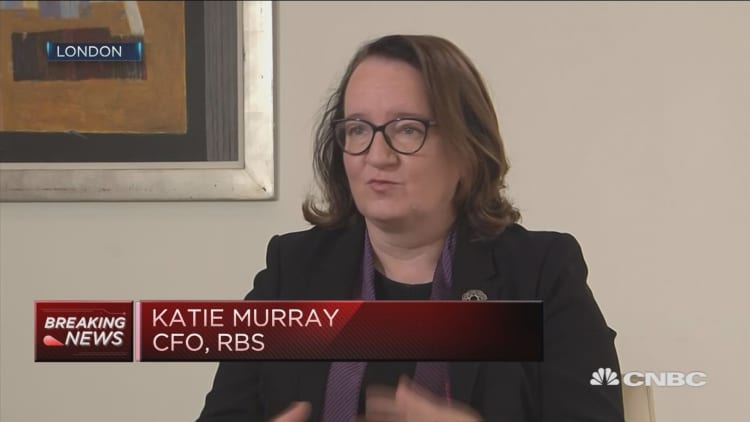
The Royal Bank of Scotland (RBS) reported a net second-quarter profit of £1.3 billion ($1.57 billion) on Friday, beating the £1 billion forecast from Reuters.
The figure is also a 1286% jump from the bank's 2018 second-quarter profits, while the bank's reported operating profit of £2.69 billion is its highest in a decade.
The British lender reported net profit attributable to shareholders of just £96 million for the same quarter last year, paying its first dividend in a decade shortly after agreeing a £3.6 billion fine to the U.S. Department of Justice (DOJ) over its selling of toxic mortgages in the run-up to the 2008 financial crisis.
The bank also announced a £1.7 billion ($2.06 billion) dividend, funded primarily by the sale of its stake in the Saudi Alawwal Bank, but warned a tough economic environment will weigh on its profitability over the next 18 months.
RBS CFO Katie Murray told CNBC's Joumanna Bercetche on Friday that £1 billion of that dividend will go directly to the British taxpayer, since RBS is still 62% publicly-owned as a result of its £45.5 billion government bailout following the 2008 crisis. The bank hopes the U.K. government will sell back its entire stake by 2030.
Here are the key figures:
- Net profit for first half of 2019 climbed 130% to £2.1 billion from £888 million in the second quarter of 2018
- The group's return on tangible equity went up to 15.8% in the second-quarter of 2019, vs. 1.1% in the same period last year
- Total income came in at £4.1 billion, vs. 3.4 billion last time.
The group's net impairment loss for the first half of 2019 came in at £323 million, a £182 million increase from the first half of 2018, which the bank attributed to a "small number of single name charges in commercial banking."
RBS also reported a cost reduction of £173 million for the first half, and kept its 2019 full-year outlook unchanged. Murray told CNBC that there was still more to do in terms of cutting costs.
"What's driving that more is the real improvement we are seeing in technology. For example, if you look at our digital sales, they are up 19% over last year, our mobile customers are up significantly as well, so the behavior and the way that people interact with us is changing completely," she said.
"That allows us to be able to take old applications out, take people out unfortunately, as well of course, and that has an impact on property, so there is definitely a lot more to do."
The bank's 2020 outlook cited "continued economic and political uncertainty and the contraction of the yield curve" as rendering it "very unlikely" that the bank will achieve its target return on tangible equity of more than 12% and cost:income ratio of less than 50% in 2020.
Murray also said the bank had taken measures to ensure it was "absolutely bulletproof" in the event of a no-deal Brexit on October 31.
"We have our liquidity ratio sitting at 154%, so we've got plenty of liquidity. Our capital, even after all these dividends, is sitting at 16% CET1, so we're lending to our customers, we're talking to them, we're making sure that they're ready in terms of what it means for them, and I think that is really important," she said.
Murray added that administrative preparations were complete and that the Brexit project had now been closed down.
RBS is also seeking a replacement for CEO Ross McEwan, who will step down in 2020, with current RBS executive Alison Rose tipped to ascend to the top job.

